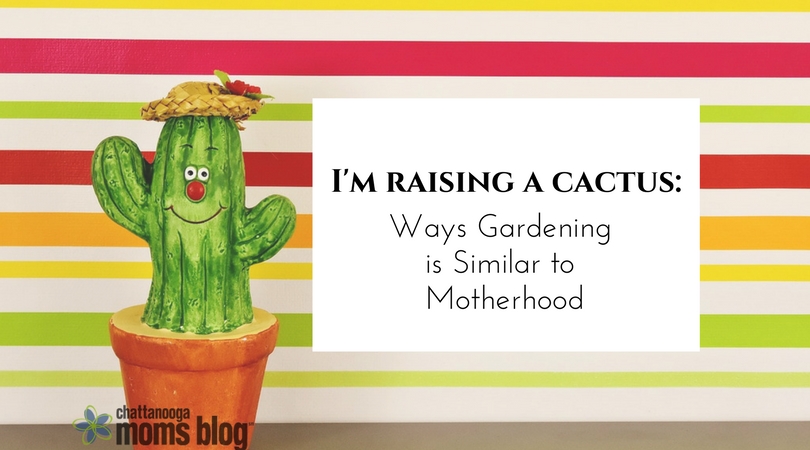
Gardens are a lesson in life, especially life as a mother. A gardener — not unlike a mother — must have patience, must care for each plant, must listen and examine each plant and care for it as best as possible. Unfortunately, our kids don’t arrive with garden tags telling us whether they prefer shade or full sun. So, how do you know if you’re raising a cactus or a fern? It’s complicated.
According to Statista, the number of gardeners has increased from over 104 million in 2008 to over 117 million in 2017. And the newest gardeners tend to be millennials who witnessed disconnection from their families due to longer work hours, economic stress, and social media. Nature reconnects us to our family and friends. That’s vitally important to my generation’s overscheduled families. Millennials are ready to relax a bit, and this may explain why, in a 2015 Pew Research survey, 52% of millennials say parenting is enjoyable. They understand the similarities of parenting and gardening.
Dedication
I am not a millennial, but I am an accidental gardener — only taking it up out of boredom and loneliness. Maybe that’s similar to my mother and her roses. I never thought to ask her. As a child, I watched my mom plant rose bushes in our backyard. This same yard was hopelessly bound by shade, so the roses were quite pathetic. From that lesson, I assumed gardening was a difficult endeavor, one that I didn’t want to attempt. But, her mother had a beautiful garden where my cousins and I happily played during summer breaks. By planting those roses, my mom was connected to her family, her mother, and her memories. You see, I didn’t know that in gardening, as in life, you mustn’t give up. Instead, you persevere; try again.
Learning through play
We live in a rural area, far from my family and many friends. So to entertain myself while my boys play in the dirt, I plant. I call the plants my science experiments because I’m not an expert (click here for our amaryllis bulb experiment). I plant the basics and see if they survive the season. I’ll enlist the boys to help with the potting soil. When it spills, they can use it to play instead of cleaning it up. One autumn day, they even helped to plant daffodil bulbs. Out of eagerness, I bought a large bag. It took us a few days to plant those little guys. Each spring, when the bulbs start to sprout, the boys are excited to see the blooms. Again, it’s all a science experiment for them and me.

Patience
With house plants, I’ve started propagating them. Basically, I’m too cheap to buy a new plant when I keep killing the old ones. So I snip off the robust parts and start a new one. I now have a windowsill full of many propagated plants. I’ll need to repot them when the weather gets warm. Patience and care even in the cold winter months maintains the plants until spring. Then, they are ready to brave the warmer elements. As moms, we nurture our kids in the same way — little by little preparing them for the world.
Finding balance
In my younger and single years, I tried raising a few house plants. My neighbor planted a beautiful albeit small garden patch outside her apartment window. I should have asked her to teach me some gardening skills. Because I had a tendency to overwater plants, and thinking I didn’t have a green thumb, I gave up on ever raising plants. I assumed each plant had the same needs. But, it doesn’t. Some need more water, others less. Some like specific nutrients while others can survive with very little care at all. Sounds familiar, right? The problem is that as a parent, you may have a child who needs more care than you had to give. But, you can learn, right? Maybe this child doesn’t need more water. But, maybe this one needs a different type of care.
Whether you’re a gardener or not, I bet you see the correlation between plants and your kids. My boys’ plant personalities fluctuate from day to day. But, you may see one below that matches your child’s personality. Right now it may be a cactus, but tomorrow it may be a fern.
Cannas, Dahlias, and Redhot Poker:
These plants are entertainers and love being the center of attention. You’ll always find them enthusiastic and ready to play.
The vine:
These kids love the wild and could play in the woods or dirt all day. But, beware, they can get invasive.
Roses:
This child may be sweet-natured, but don’t mistake his ability to defend himself. He demands specific attention. If he isn’t happy or feels he’s been disrespected, the thorns will appear.
Cactus:
Spiky personality and likes to keep things interesting, maybe a little adventurous. These plants look scary but there’s a bonus. They require very little care.
Houseplant:
This child is a definite introvert who likes to sit and read or draw. Just give her some natural light and she will blossom.
Grasses and Hostas:
These shade-loving plants go with the flow, are easy care, and create a relaxed atmosphere.
Hedges:
Is your little one the reliable one? Nothing seems to faze this kid — noises, accidents, yelling. This child could raise other kids on her own. She’s just like a reliable evergreen.
Ferns:
Sociable and gets along with everyone. This is the child you use to separate the others.



















